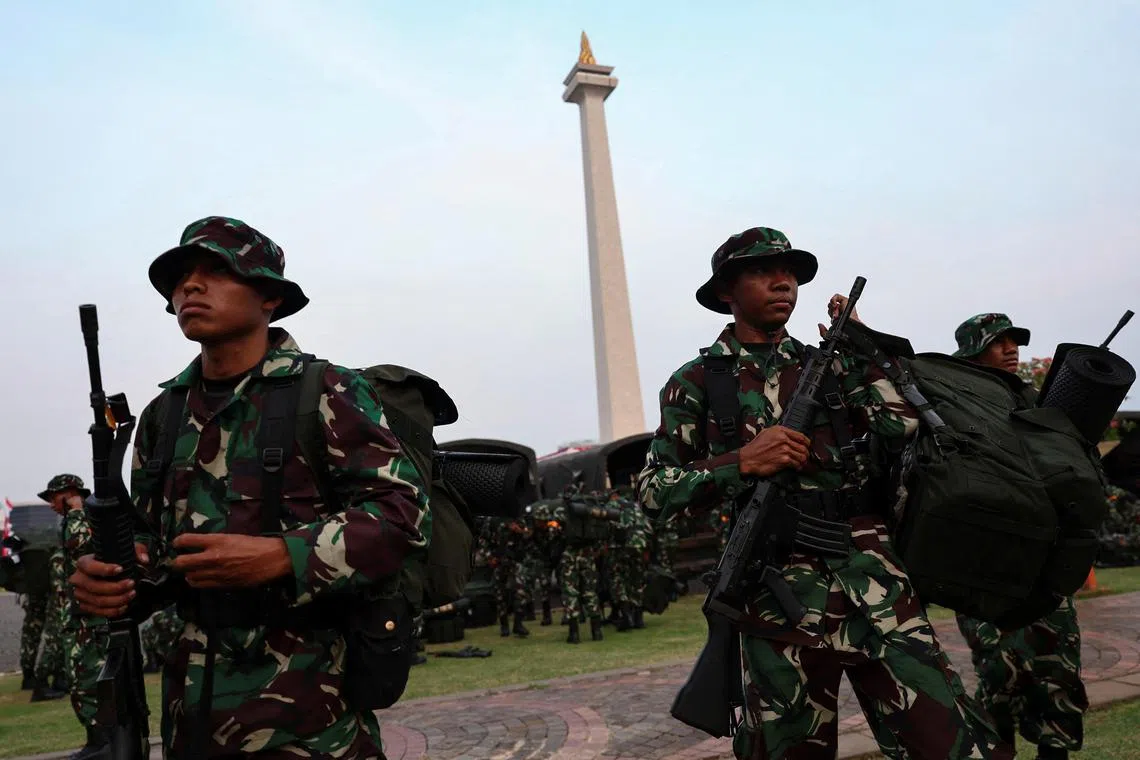Indonesia tightens security after deadly protests
Sign up now: Get insights on Asia's fast-moving developments

Deadly protests in Indonesia, which began last week over financial perks for lawmakers, have forced President Prabowo Subianto to reverse the measures.
PHOTO: REUTERS
Jakarta – Indonesian authorities ramped up security on Sept 1 after six people were killed in unrest over lavish perks for lawmakers that escalated into violent anger at the nation’s police force.
The deadly protests, which began last week
Demonstrations that began peacefully turned violent against the nation’s elite paramilitary police unit after footage showed one of its teams running over 21-year-old delivery driver Affan Kurniawan late on Aug 28.
Protests have since spread from Jakarta to other major cities, in the worst unrest since Mr Prabowo took power, with more rallies planned on Sept 1 across Indonesia’s vast archipelago.
The police set up checkpoints across the capital on Sept 1, while officers and the military conducted citywide patrols and deployed snipers at key locations.
Demonstrators were expected to start gathering outside Parliament in Jakarta and at the national police headquarters.
But at least one group, the Alliance of Indonesian Women, said late on Aug 31 that it had cancelled its planned protest because of heightened security.
The capital’s police force paraded a convoy of armoured cars and motorbikes outside Parliament late on Aug 31 in a show of force as they attempted to warn off protesters.
Schools and universities in Jakarta were to hold classes online until at least Sept 2 and civil servants based in Jakarta were asked to work from home.
Experts said Mr Prabowo’s U-turn in a speech on Aug 31 and Parliament’s gesture to revoke some lawmaker perks may not be enough to dispel the unrest.
“The Indonesian government is a mess. The Cabinet and Parliament will not listen to the people’s pleas,” 60-year-old snack seller Suwardi, who like many Indonesians goes by one name, told AFP near Parliament.
“We have always been lied to. That’s why people are always angry. Because they never meet our demands.”
The Indonesian stock index fell more than 3 per cent at the open on Sept 1 after the weekend unrest rattled markets.
Looting
Deep-rooted anger against police drove protests on Aug 29 after footage of the van hitting Mr Affan went viral.
Seven officers were detained for investigation.
On Sept 1, Mr Agus Wijayanto, head of the accountability bureau at the National Police, told reporters that an investigation had found criminal acts committed by two officers – the driver of the van and the officer next to him.
They “could be dishonourably discharged”, Mr Agus said, adding that their ethics trial would take place on Sept 3.
The crisis forced Mr Prabowo to cancel a planned trip to China this week for a military parade commemorating the end of World War II.
The protests are the biggest and most violent of his presidency, a key test less than a year into his rule.
Defence Minister Sjafrie Sjamsoeddin, Mr Prabowo’s close ally, warned on Aug 31 that the military and police would take “firm action” against “rioters and looters”, after Finance Minister Sri Mulyani Indrawati’s house was pillaged.
Several lawmakers have reportedly had their houses ransacked in recent days.
Besides Jakarta, there have also been protests in cities, including Yogyakarta, Bandung, Semarang and Surabaya in Java, and Medan in North Sumatra province.
At least three people were killed
Another victim died in Makassar on Aug 29 after he was beaten by a mob on suspicion of being an intelligence officer, local disaster agency official Muhammad Fadli Tahar told AFP on Aug 31.
In Yogyakarta, Amikom Yogyakarta University confirmed the death of student Rheza Sendy Pratama in protests, though the circumstances around his death remain unclear.
In anticipation of further unrest, social media platform TikTok on Aug 30 temporarily suspended its live feature for “a few days” in Indonesia, where it has more than 100 million users. AFP


